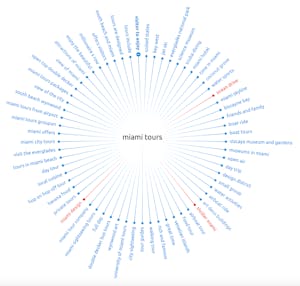- 7 minute read
- Websites
The Truth About Web Accessibility: Don’t Fall for These 5 Myths
Beginner
Get a behind-the-scenes-look into FareHarbor's 2024 season

SEO best practices can quickly go out of fashion since search engines like Google make constant updates to improve their algorithms.
We know it can feel difficult to stay up to date on the best SEO strategies.
If you find yourself wondering about topics like keyword stuffing or buying links, it’s time for an SEO refresh.
We’ve rounded up the most outdated SEO practices so you can replace them with fresh strategies that will yield positive results to your traffic and rankings.
Buying links is one of those old tactics that seems too good to be true… and that’s exactly the case.

If you’ve noticed us mention the importance of link building, you can understand why some website owners would be tempted to buy backlinks in bulk to boost their traffic.
Unfortunately, Google can easily identify this spammy practice when low-quality websites send out a huge number of links at once.
 What To Do Instead
What To Do InsteadThere’s no magic way to acquire hundreds of links overnight. Link building is hard work, but it’s well worth the effort to receive links from trustworthy sites that can improve your SEO.
Instead of buying links, focus on writing blog posts for your target audience, researching the best keywords to use, and finding resources within your industry.
By making your website trustworthy and full of useful content, you’ll find it easier to ask other websites to link to your content. Learn how to get more backlinks in this guide.
Exact-match domain names typically use precise keywords (e.g. findfreetextbooks.com) to “trick” Google into ranking them better.
However, exact-match domains aren’t valued the way they once were. In fact, there is no SEO bonus for using keywords in your domain name, and stuffing too many keywords into a long domain name is seen as a “shady” or spammy practice.
 What To Do Instead
What To Do InsteadSometimes keywords do work in your domain name, like if your business is called Denver Walking Tours or Budapest History Tours. But if your business name doesn’t use relevant keywords, there’s no need to stress about adding them to your domain name.
Instead, use a domain name that’s short, easy to pronounce, brandable and intuitive. For tips on choosing the right domain name, check out our domain do’s and don’ts.

Keyword implementation is perhaps the biggest source of SEO misinformation. There are so many outdated keyword strategies that it can feel hard to keep up. Here are a few common ones to look out for:
In the early days of SEO, search engines interpreted simpler signals, like how many keywords were on a page. As a result, websites stuffed as many keywords as possible onto a page to rank for a given query.
Today’s sophisticated search engines recognize this bad practice – and will rank your site negatively as a result.
 What To Do Instead
What To Do InsteadWrite your content for human readers, not faceless algorithms. When you write content in the same way you would describe your business to a potential customer, keywords will flow naturally and readers will be more likely to trust your business.
This outdated approach involves creating separate pages for variations of the same keyword.
For example, if you wanted to write a guide for first-time visitors to your city, the old method would involve creating separate pages for the targeted keywords, like attractions, things to do, how to get there, and more.
 What To Do Instead
What To Do InsteadMaking one comprehensive page for a keyword topic is a far better use of your website (and time!). Not only is it more intuitive for readers, but search engines can easily recognize that this one page is relevant to several keyword variations.
Any time you do keyword research, you’ll likely see some longer keyword phrases you want to rank for. These are known as long-tail keywords and are phrases such as “best walking tours winter miami” or “what to pack backpacking trip”.
While targeting these keywords is certainly worthwhile, using the exact-match variation of a given keyword in your web copy isn’t always possible because of how unnatural it sounds in a full sentence.
 What To Do Instead
What To Do InsteadThe bottom line for keyword implementation is to write for your readers, not search engines. Using exact-match keywords can make your writing seem unnatural. Content is all about readability, so strive to write your copy in the same way you would speak to someone.
For example, instead of saying “we offer the best walking tours winter miami,” your content should say “we offer the best winter walking tours in Miami.”

Don’t let these outdated tactics hold you back! If you plan your content around your customers and focus on writing for search intent, you should have no problem naturally implementing keywords.
Remember to check back for new SEO guides to stay on top of the latest trends, algorithm updates, and search engine news you need to know.